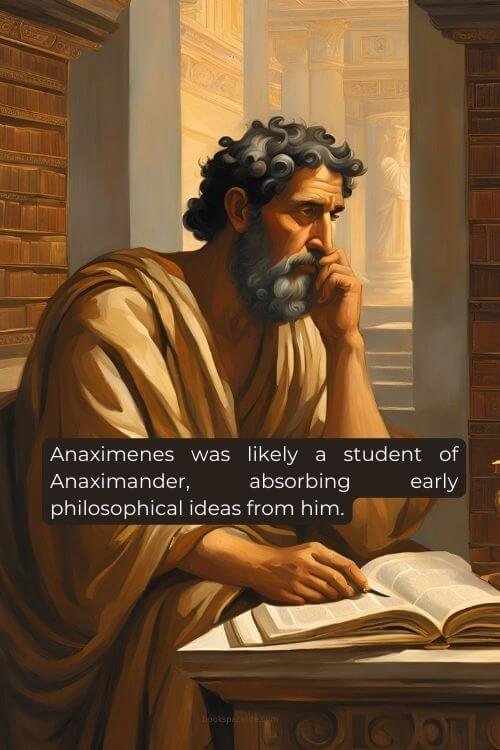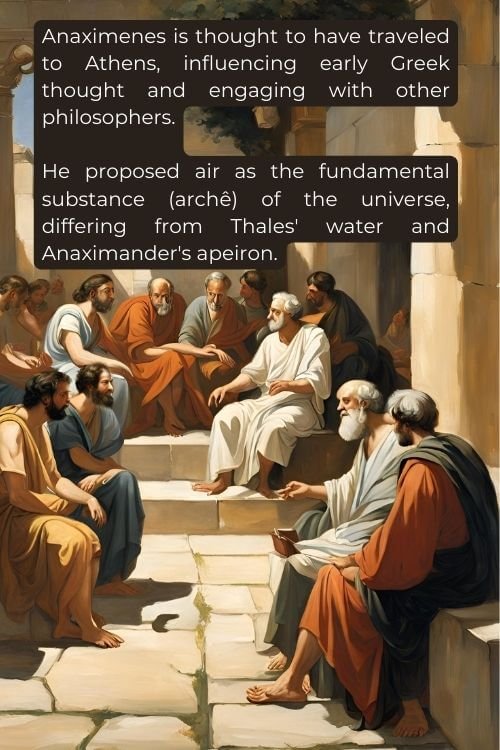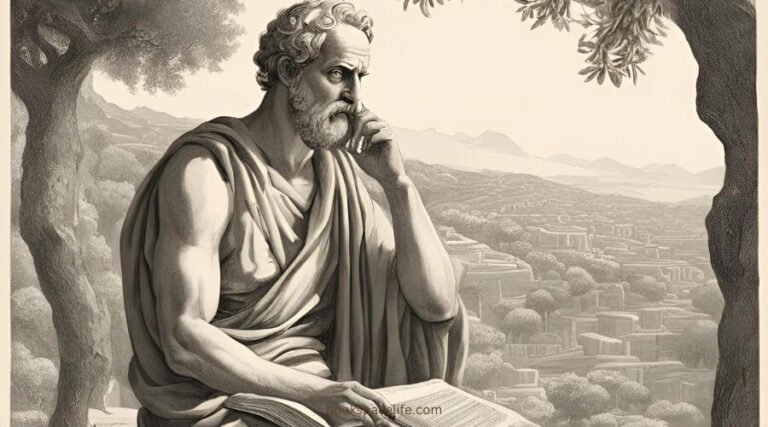Anaximander
Anaximenes: The Philosopher of Air and the Cosmos
Anaximenes of Miletus (c. 586 – c. 526 BCE) was a pre-Socratic philosopher who played a crucial role in the early development of cosmology and metaphysics.
As a successor to Thales and Anaximander, Anaximenes contributed significantly to the philosophical inquiry of his time, offering a unique perspective on the nature of the universe.
His exploration of the fundamental substance of reality, particularly his emphasis on air as the primary principle, marks a pivotal moment in ancient philosophy.
This blog post delves into Anaximenes’s life, travels, early education, philosophical contributions, and his lasting influence on subsequent thought.
Quick Read
Table of Contents
(1) Early Life and Education
Anaximenes was born in Miletus, a prominent city in ancient Ionia (modern day Turkey), known for its intellectual vibrancy and contributions to philosophy and science.
The exact date of his birth is uncertain but is typically placed around 586 BCE. Miletus was a center of trade and cultural exchange, providing Anaximenes with a rich environment that influenced his intellectual development.
Anaximenes was likely a student of Anaximander, who himself was a disciple of Thales, the first known philosopher in Western history.
Through his education, Anaximenes encountered the foundational ideas of early Greek philosophy, which emphasized rational inquiry and the search for the underlying principles of existence.
While specific details about his education are scarce, he inherited a tradition of philosophical inquiry that sought to explain the cosmos in a systematic manner.

(2) Travels and Philosophical Development
Anaximenes’s philosophical development was likely shaped by the dynamic intellectual environment of Miletus and possible travels throughout the Mediterranean.
While the specific details of his travels are not well-documented, it is reasonable to assume that Anaximenes engaged with various philosophical ideas and cultural traditions, expanding his understanding of the world.
Through interactions with other thinkers and exposure to different ideas, Anaximenes honed his thoughts on the nature of the universe and the principles that govern it.
His engagement with other philosophical schools, particularly those in Ionia and beyond, allowed him to refine his ideas and articulate a coherent philosophical framework.
(3) Philosophical Contributions
Anaximenes is best known for his work in cosmology and metaphysics, particularly his concept of air as the fundamental substance of the universe. His philosophical contributions can be summarized in several key ideas:
- Air as the Primary Principle: Anaximenes posited that air (or “aer” in Greek) is the essential substance from which everything in the universe originates.
He argued that all matter is a form of air, which can transform into different states through processes of rarefaction and condensation.
This idea was a significant departure from Thales’s view of water and Anaximander’s concept of the Apeiron as the infinite source. For Anaximenes, air is both the substance and the principle of life, providing a more tangible foundation for understanding the cosmos.
- Cosmological Model: Building on the ideas of his predecessors, Anaximenes developed a cosmological model that explained the formation of the universe.
He believed that air, through certain processes, could form various elements, including fire, water, and earth.
This model allowed Anaximenes to propose a more dynamic and interconnected view of the cosmos, where different states of matter are linked by their origin in air.
- The Nature of Change: Anaximenes’s ideas about air also extended to his understanding of change in the universe.
He suggested that changes in the state of matter result from the density and rarity of air. For example, when air condenses, it becomes denser, resulting in the formation of water or earth; conversely, when air is rarefied (low pressure), it produces fire.
This notion of change through variations in density reflects Anaximenes’s attempt to explain natural phenomena in a systematic manner.
- Influence on Future Philosophers: Anaximenes’s work laid the groundwork for later philosophical inquiries into the nature of substance and the principles governing the universe.
His emphasis on a single underlying substance as the source of all things resonated with subsequent thinkers, including Heraclitus and Democritus, who further explored the nature of reality and change.
- Rational Inquiry and Natural Philosophy: Anaximenes’s philosophical approach emphasized the importance of observation and rational thought in understanding the natural world.
By seeking to explain natural phenomena through a unifying principle, he contributed to the development of natural philosophy, paving the way for later scientific thought.

(4) Influence and Impact
Anaximenes’s contributions to philosophy and science had a lasting impact on the intellectual landscape of ancient Greece and beyond. His ideas influenced subsequent philosophers and laid the groundwork for future developments in cosmology and metaphysics.
- Foundational Role in Natural Philosophy: Anaximenes is often regarded as one of the early natural philosophers who sought to explain the universe in terms of fundamental substances and principles.
His work set the stage for later thinkers to explore the nature of reality and the laws governing it, marking a significant shift in philosophical inquiry.
- Influence on the Pre-Socratic Tradition: Anaximenes’s ideas were part of the broader pre-Socratic tradition, which sought to move beyond mythological explanations of the world.
His emphasis on a rational, observable approach to understanding nature influenced later philosophers, including Pythagoras and Parmenides, who expanded upon the foundational ideas established by Anaximenes and his predecessors.
- Impact on Scientific Thought: Anaximenes’s notion of air as a fundamental substance anticipated later developments in natural science.
His ideas about the transformation of matter through processes of condensation and rarefaction foreshadowed later theories of matter and energy.
The emphasis on observation and rational inquiry in Anaximenes’s work laid the groundwork for the scientific method that would emerge in the Renaissance.
- Cultural and Historical Significance: Anaximenes’s contributions reflect the rich intellectual culture of ancient Greece, characterized by a quest for knowledge and understanding of the natural world.
His work is emblematic of a period marked by curiosity, exploration, and the desire to comprehend the complexities of existence.
- Legacy in Philosophy and Education: Anaximenes’s innovative ideas and philosophical approach influenced not only philosophers but also educators and scholars throughout antiquity.
His work became part of the curriculum in ancient schools, shaping the intellectual development of subsequent generations.
(5) Conclusion
Anaximenes of Miletus stands as a significant figure in the history of philosophy and science, whose contributions to cosmology and metaphysics have left a lasting impact on the intellectual landscape.
His innovative ideas about air as the fundamental substance of the universe and his emphasis on rational inquiry represent a critical evolution in philosophical thought.
Through his exploration of the nature of existence, Anaximenes helped lay the groundwork for future philosophical inquiries, inviting subsequent thinkers to explore the complexities of the cosmos.
His legacy endures in contemporary discussions about the nature of reality, the principles governing the universe, and the pursuit of knowledge through reason and observation.
As we reflect on Anaximenes’s contributions, we are reminded of the power of human inquiry and the enduring quest for understanding that defines the human experience.
His life and work serve as a testament to the transformative potential of philosophy, encouraging us to continue exploring the mysteries of existence and our place within the universe.
(A) Anaximenes – 7 Facts
- Born in Miletus – around 586 BCE in the ancient Greek city of Miletus (Ancient Ionia; modern-day Turkey)
- Historical Context – He lived during the 6th century BCE, a time when philosophical inquiry began to shift from mythology to rational explanations of the cosmos.
- Early Education – Anaximenes was likely a student of Anaximander, absorbing early philosophical ideas from him.
- Travel to Athens – Anaximenes is thought to have traveled to Athens, influencing early Greek thought and engaging with other philosophers.
- Philosophical Contributions – He proposed air as the fundamental substance (archê) of the universe, differing from Thales’ water and Anaximander’s apeiron.
- Influence on Later Thought – His ideas laid the groundwork for later natural philosophers, contributing to the development of cosmology and metaphysics.
- Relation to Pythagoreanism – Anaximenes’ emphasis on a singular principle influenced later thinkers, including the Pythagoreans, in their quest for unity.
(B) Anaximenes– 10 Quotes
- Just as our soul, being air, holds us together, so do breath and air encompass the whole world. Suggesting that air is the essence of life and existence.
- Air is the primary substance of the universe, the source of all things. Emphasizing the fundamental role of air in creation.
- Everything is a form of air, and it transforms through rarefaction and condensation. Explaining how air can change into various substances.
- The earth rests on air, and it is air that supports it. Indicating the foundational role of air in the structure of the universe.
- What is dense is earth; what is rarefied is the divine. Distinguishing between physical matter and the divine through density.
- The universe is a single, living entity, pervaded by air. Reflecting on the interconnectedness of all things through air.
- It is the infinite and eternal air that transforms into all things. Highlighting the transformative power of air in the cosmos.
- The stars are fiery, and they are borne by the air. Discussing the nature of celestial bodies in relation to air.
- In every change, there is a harmony between opposites. Suggesting that transformation is based on a balance of dualities.
- To know the cosmos is to understand the nature of air. Stating that knowledge of the universe begins with understanding its fundamental substance.








